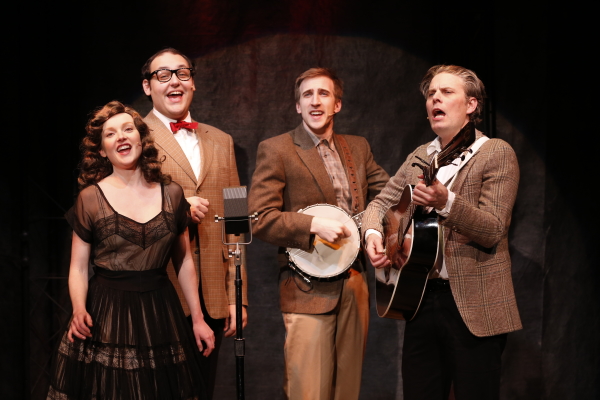Lonesome Traveler

(© Carol Rosegg)
The story of America is in its folk music. From the African-American spirituals sung on the Southern plantations, to the Dust Bowl Ballads that sprang from the plains of Oklahoma, to the songs of peaceful protest that mobilized the civil rights movement — the same, ever-evolving tunes draw a straight line from the beginning of our social history to the present day. It's a fascinating narrative, and yet it's quite a tough row for 59E59 Theaters' musical chronicle, Lonesome Traveler, to hoe in two acts.
Writer and director James O'Neil tries to trek the entirety of this timeline in just two hours, waffling between a history lesson and a tribute concert to his favorite American folk artists. After a down-home welcome from the cast, two television screens, each on either side of the stage, turn back the clock from 2015 to 1958 where The Kingston Trio greets us with a medley of "Shady Grove" and "Lonesome Traveler." The title song's Appalachian roots then manifest in a backwoods scene, set in 1926 as recording technology was just being developed. A woman sitting on the porch of her mountain home (designed by Thomas S. Giamario) sings the same tune with a bluesy rhythm (the first of many soulful performances by Jennifer Leigh Warren, who later appears as Odetta). Stepping out from behind a shadowy scrim, she takes the stage with Justin Flagg, our primary MC who assumes the title of "Lonesome Traveler" and preps us for the musical evening:
"Maybe just a few stories about how it all happened," he says to the crowd.
"Helpin' folks remember who we were and what we sung about," our mountain woman adds.
These introductory words capture the extent of the show's modest ambitions: to deliver a series of vignettes that cut to the heart of America's musical identity — chronology, nuance, and thematic focus be damned.
Narrative gives way to the bill of 30-plus songs listed in the program, playing like a collection of greatest hits. Luckily, the audiences coming out to see Lonesome Traveler are already sold on the genre, and are there exclusively to partake in a nostalgic hootenanny — a promise on which the show unequivocally delivers. O'Neil unabashedly makes the music his primary investment as blatant anachronisms are acknowledged and brushed off with a carefree sarcasm in order to make room for his parade of guest stars. After all, why deny The Weavers, circa 1950, a chance to introduce Judy Collins in a performance of "Turn! Turn! Turn!" (her warbling soprano perfectly re-created by Jamie Drake) just because she is at least a decade away from actually recording her rendition? The pretense of a story quickly fades away as O'Neil and his audience silently agree to revel in our favorite tunes, joyfully sing along with our talented musical hosts, and check any further expectations at the door.
Flagg does a spot-on Pete Seeger in the Woody Guthrie tune "So Long, It's Been Good to Know Yuh," among others that he accompanies on banjo or guitar. Matty Charles and Sylvie Davidson beautifully perform Gordon Lightfoot's "Early Mornin' Rain" as folk duo Ian and Sylvia, one of the show's most accurate replicas. Davidson also returns as Mary Travers of Peter, Paul, and Mary — nobly attempting the iconic Travers hair flip in her bleach-blond wig (a crude replica of the singer's signature style by Marty Kopulsky) — joining Flagg (Peter Yarrow) and Nicholas Mongiardo-Cooper (Paul Stookey) for the group's classic tune "Flora" and sentimental favorite "Puff, the Magic Dragon." Mongiardo-Cooper enjoys a standout moment as well as Cisco Houston, singing Woody Guthrie's haunting protest song "Deportee," while Anthony Manough portrays ex-con rock-and-roller Lead Belly in a stirring version of "Midnight Special" as well as the audience favorite "Goodnight, Irene."
We only make it as far as the 1965 Newport Folk Festival, when names like James Taylor, Carole King, Crosby, Stills, and Nash, and other artists who went on to pick up the folk baton flash across the pair of television screens. The rapid-fire slideshow sprints us back to present day — a time when pure folk music, stripped of its "pop" or "rock" prefix, often feels like a stale relic from the past. Nonetheless, it's comforting to know there is a group of people out there who're still ready and willing to partake in a few rousing verses of "Tom Dooley."










